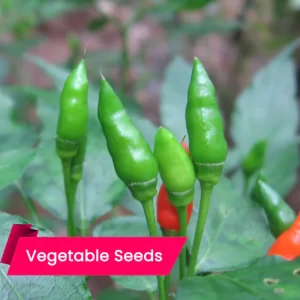
Delight your taste buds with the fiery allure of small-sized hot chilies, where size belies an explosion of flavor.
A variety of colorful bird’s eye chilies are available in the market.
Kanthari Chilli, with its antimicrobial and anti-fungal properties, not only adds flavour to dishes but also lowers the risk of heart disease prevents blood clots, and acts as a painkiller. It possesses various medicinal properties, including the ability to reduce cholesterol and blood pressure. This short-lived plant features small, aromatic fruits and white flowers, offering not just spice but also health benefits, aiding in weight loss, joint pain relief, and immunity boost—a versatile and beneficial choice for both culinary enjoyment and well-being.
Ensure Successful Grow Bag Planting:
Treat the soil beforehand and use high-quality seeds for optimal results. This proactive approach enhances the overall health and productivity of your plants. Select a sunny spot with protection from rain or wind. Clean and prepare the grow bag by adding a drainage layer of gravel, followed by a mix of garden soil, compost, and cocopeat or perlite for optimal growth.
Kanthari cultivation offers several benefits. It adapts well to grow bags and potsi home terrace, providing flexibility in various cultivation settings. With a potential yield of about 6.74 t/ha of dry pods and 28.10 t/ha of green chilies over a crop duration of 195-205 days, kanthari cultivation proves to be a fruitful and rewarding endeavor.
Ater the initial growth of kanthari plants, wait for 2-3 weeks and selectively separate healthy plants for further cultivation. Known for its high market value, kanthari mulaku is widely utilized as a cholesterol-reducing ingredient. Explore its diverse hues, adding both visual appeal and nutritional richness to your cultivation.
Tips:
Combatting Leaf Curl in Kanthari Mulaku Plants: Use diluted cow urine and neem oil, remembering to mix with water. Preventive care includes applying cold rice water after boiling rice. Protect your plants effectively with these natural remedies.
Prefers shade, needs regular watering. Can tolerate sunlight with enough water, but fruiting may suffer. Neglect may lead to withering and hibernation in open ground during summer.
